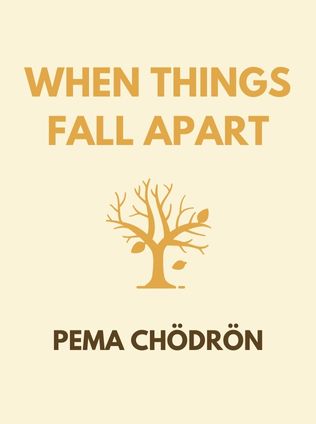
When Things Fall Apart
Heart Advice for Difficult Times
By Pema Chödrön
Published 12/1996
About the Author
Pema Chödrön is a highly respected American-Tibetan Buddhist nun, teacher, and author. Known for her teachings on mindfulness, meditation, and compassionate living, Chödrön draws deeply from ancient Buddhist wisdom. She studied under the guidance of the Tibetan Buddhist meditation master Chögyam Trungpa and has authored more than 20 books, including the widely acclaimed When Things Fall Apart. Her teachings emphasize embracing life's experiences, both positive and negative, as opportunities for spiritual growth and personal transformation. Chödrön's work resonates with a global audience, offering practical advice for navigating the challenges of modern life with grace and wisdom. As a mother of two and a former schoolteacher, she brings a relatable, compassionate perspective to her teachings, making complex Buddhist principles accessible and applicable to everyday life.
Chödrön's approach to teaching is rooted in the belief that suffering is not something to be avoided, but rather a natural part of the human experience that can lead to profound personal growth. She encourages her readers to face their fears, embrace uncertainty, and develop compassion for themselves and others. Her work is particularly focused on helping people navigate difficult times, whether they are facing loss, conflict, or personal crises. Through her teachings, Chödrön offers a path to finding peace and resilience in the midst of life's inevitable challenges.
Main Idea
When Things Fall Apart is a powerful exploration of how to navigate life’s most challenging moments using ancient Buddhist wisdom. Chödrön argues that pain and suffering are inevitable parts of life, but they also offer opportunities for growth and transformation. She draws on Buddhist teachings to offer practical advice for staying present, cultivating compassion, facing fears, and accepting reality as it is. The book is a collection of talks given by Chödrön between 1987 and 1994, each offering profound insights into the nature of suffering and how to live fully, even when life feels overwhelmingly difficult.
Table of Contents
- Why We Suffer
- How to Ease Suffering and Navigate Difficult Times
- Practice Meditation and Mindfulness
- Cultivate Compassion for Yourself and Others
- Turn Toward Fear and Let Go of Hope
- Accept Reality as It Is
Why We Suffer
Chödrön begins by exploring the root causes of suffering. She explains that suffering arises when our deeply held beliefs conflict with reality. We often believe that suffering is unacceptable and that we should do everything in our power to avoid it. Additionally, we may cling to the hope that we can achieve lasting security in life by controlling our circumstances. These beliefs set us up for disappointment and pain because they are not aligned with the truth of existence—life is inherently uncertain, and suffering is a natural part of being human.
"We suffer because we believe that suffering should not exist, and we cling to the hope that we can create a life free from pain." — Pema Chödrön
Chödrön emphasizes that resisting suffering and clinging to the illusion of control only intensifies our pain. Instead, she advocates for accepting suffering as an inevitable part of life and recognizing that discomfort is not a sign that something is wrong with us or the world. By letting go of the need for things to be different than they are, we can begin to find peace even in the midst of difficult circumstances.
False Belief #1: Suffering Is Unacceptable and Should Be Avoided
Many of us believe that suffering is something unnatural that should be avoided at all costs. We think that emotional discomfort signals that something is wrong, and we go to great lengths to avoid or fix it. This belief leads to a cycle of resistance, where we deny or repress our painful emotions, only to find that they return with greater intensity. Chödrön teaches that suffering is a natural part of life that affects all living beings. By accepting this truth, we can begin to see suffering not as a sign of failure, but as an opportunity for growth.
Sign up for FREE and get access to 1,400+ books summaries.
You May Also Like
The Subtle Art of Not Giving a F*ck
A Counterintuitive Approach to Living a Good Life
By Mark MansonRich Dad Poor Dad
What the Rich Teach Their Kids About Money - That the Poor and Middle Class Do Not!
By Robert T. KiyosakiHow To Win Friends and Influence People
The All-Time Classic Manual Of People Skills
By Dale CarnegieFreakonomics
A Rogue Economist Explores the Hidden Side of Everything
By Steven D. Levitt and Stephen J. Dubner



















